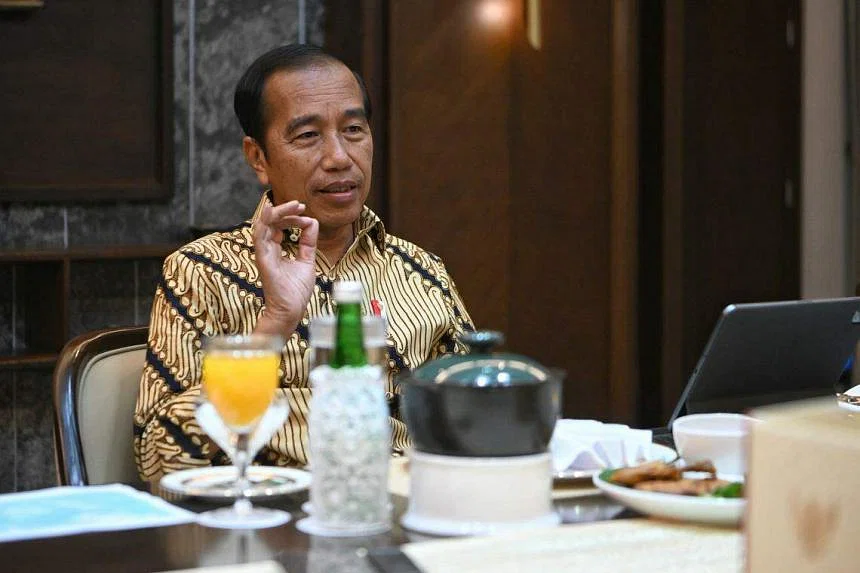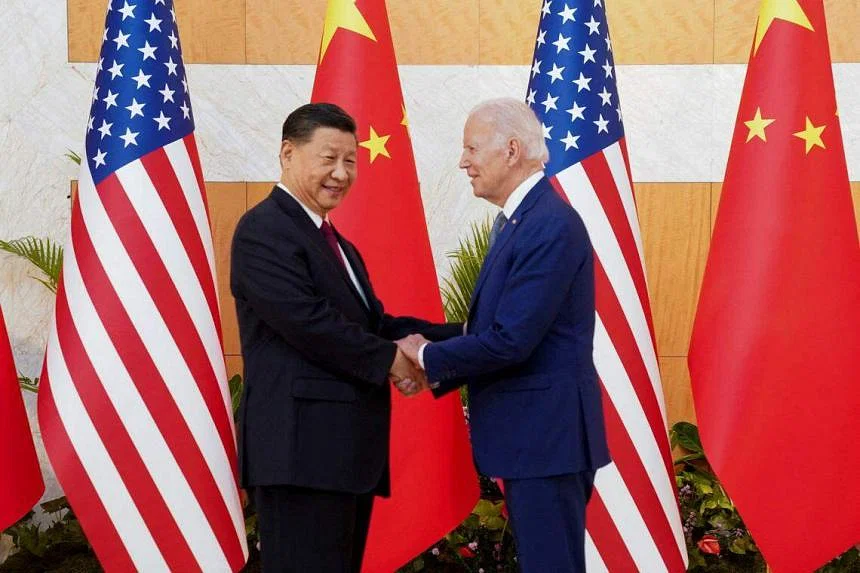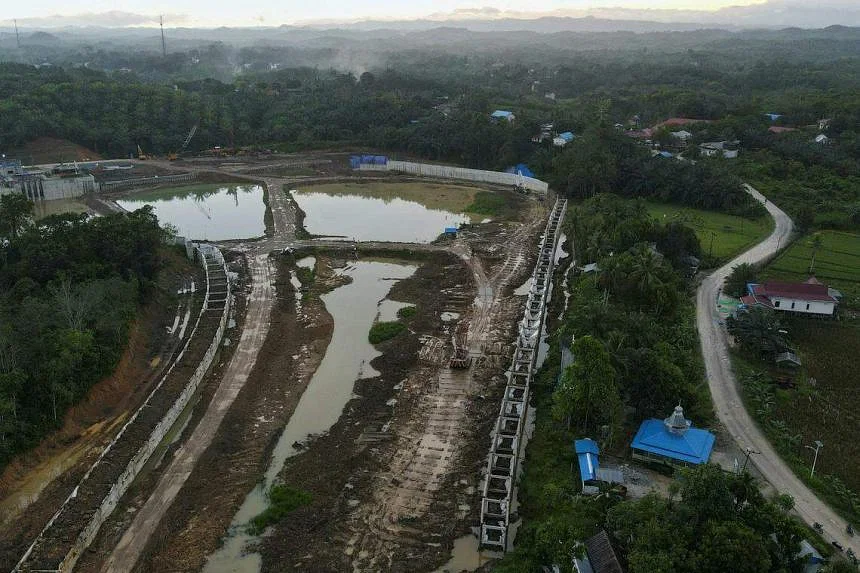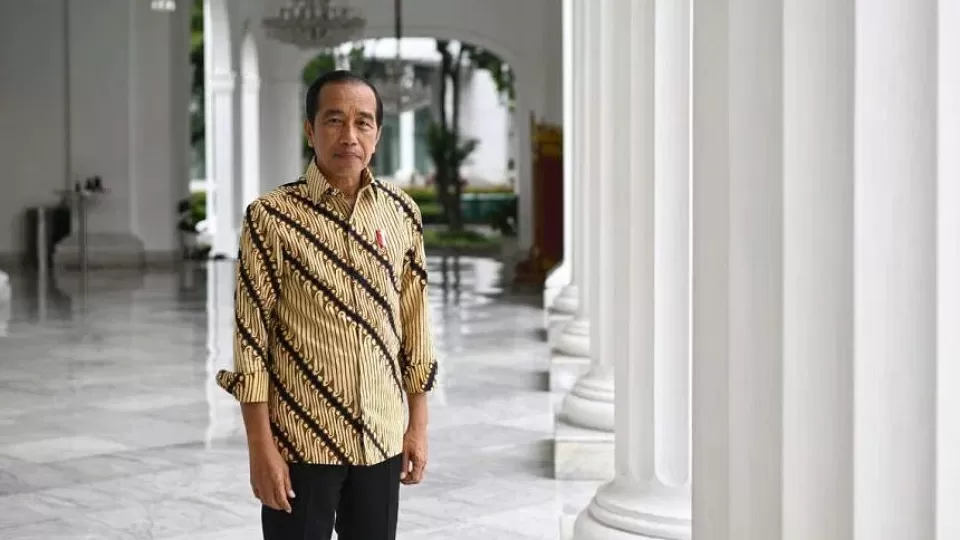March 16, 2023
JAKARTA – Walking into a dining hall at the state palace in Jakarta to meet journalists from The Straits Times on Wednesday, Indonesian President Joko Widodo looked fresh and relaxed despite days of back-to-back work trips across the country.
Nothing that jogging and cycling twice a week and a daily dose of jamu cannot fix, he said, adding that he has been drinking a concoction of ginger and temulawak, a type of Javanese turmeric, for more than two decades.
To relax, he loves listening to his pet frogs. “Their croaking at night is soothing. The frogs themselves aren’t,” he deadpanned, before inviting ST to his state palace in Bogor, West Java, to see them, along with his pet goats, cats and chicken.
After nearly a decade as president of South-east Asia’s largest country and economy, Mr Widodo has no airs about him. But there is the slightest tinge of pride as he states matter-of-factly: “Saya orang kampung,” meaning “I am a villager”.
The former furniture businessman was elected mayor of Solo in 2005, and then governor of Jakarta in 2012. When he was elected president in July 2014, he broke from the mould of past leaders who hailed from the political elite or the military.
Dressed in his trademark white shirt with rolled-up sleeves and a pair of sneakers, he appealed directly to the middle and working classes with his down-to-earth, yet no-nonsense approach to work.
Even now, the 62-year-old has continued to carry out his famous blusukan, or unannounced visits, to personally check on places, be they government offices, traditional markets or even forest fire hot spots.

Indonesian President Joko Widodo, seen here at the state palace in Jakarta on Wednesday, is known to have a hands-on approach to governance, dropping in unannounced to personally check on places. ST PHOTO: ARIFFIN JAMAR
Sometimes, other world leaders tag along. He took former Philippine counterpart Rodrigo Duterte on a visit to a textile market in Tanah Abang in September 2016.
These visits offer Indonesians an opportunity to interact directly with him, and they seal his reputation as a doer rather than a talker. His regular social media posts and statements from the presidential palace about these engagements provide a glimpse into his world and the things he cares about.
On Monday, he flew to Labuan Bajo, a small fishing town in East Nusa Tenggara province where the Asean Summit is set to take place in May, to check on the preparations for the meeting of regional leaders.
“Several venues are all ready. There are only a few final touches left to be done,” he told reporters later.
“But most importantly, we want to promote Labuan Bajo as a super-priority destination,” he said of the picturesque gateway town to the nearby Komodo National Park islands.
Riding high on the success of its Group of 20 presidency and the leaders’ summit it hosted last November, Indonesia faces high expectations to pull off another successful high-level meeting as the rotating chairman of Asean this year.
And there is plenty on Indonesia’s plate – from dealing with the worsening violence in Myanmar, to the escalating tensions between Asean members and China over territorial disputes in the South China Sea.
Such highly complex situations take time to resolve, Mr Widodo said.
Global leader
At the end of his second and final term in office, Jokowi, as the Indonesian leader is better known, has been sprucing up his global credentials, surprising his critics who had doubted his capacity for foreign policy.
He visited a Muslim Rohingya refugee camp at Cox’s Bazar in Bangladesh in 2018, bringing humanitarian aid.
Ahead of the G-20 summit last year, he flew to Moscow and Kyiv to urge peaceful dialogue between Russian President Vladimir Putin and Ukrainian President Volodymyr Zelensky, personally inviting both to the high-profile meeting.
Although neither turned up, the rest on the guest list did. The historic handshake between United States President Joe Biden and Chinese President Xi Jinping also made world headlines. Mr Widodo, in turn, won plaudits as the friendly host who pulled off a united summit.

The historic handshake between Chinese President Xi Jinping and his US counterpart Joe Biden in Bali in November 2022 made world headlines. PHOTO: REUTERS
His voice has since grown louder. He told regional foreign ministers in February that “Asean should not become a proxy for any power”, ostensibly referring to the US and China, which are both angling for dominance in the region.
His clarion call has not fallen on deaf ears. Chinese Foreign Minister Qin Gang, during his February visit, acknowledged that regional countries “should not be forced to pick sides”.
Echoing the view, US Assistant Secretary of State for East Asian and Pacific Affairs Daniel Kritenbrink told reporters in Jakarta during a visit last week that the US wanted Asean “to make your own choices, free from coercion”.
Mr Widodo told ST that the intensifying rivalry between the US and China is worrying, and “history tells us that when a country or a region becomes a proxy, then instability is the result”.
Indonesia is good friends with the US and China as both trade and investment partners, he said, adding that the two superpowers, in turn, are aware that Indonesia’s foreign policy is “free and active”, which means it does not side with any one party.
He said: “The US and China understand very well Indonesia’s position, that Indonesia chooses peace and brotherhood. That is why they trust Indonesia.”
Return to family
International and regional duties aside, Mr Widodo puts domestic matters first.
In recent years, he has pushed to improve Indonesia’s infrastructure, building roads, railways and dams, which he believes would change the fortunes of the country’s nearly 280 million people.
Tourism is also high on his list as one of the new drivers of economic growth, hence the choice of lesser-known places such as Labuan Bajo to host international events.
His face lit up as he spoke enthusiastically about Indonesia’s plans to grow tourism and investments, particularly in the development of Nusantara, Indonesia’s new capital city in East Kalimantan province.

Construction of the Sepaku Intake dam, which will supply clear water for Indonesia’s new capital Nusantara, in Sepaku in East Kalimantan province. PHOTO: REUTERS
Despite speculation that he will stay in politics after his term ends in 2024, the father of three and grandfather of five said he has other plans – to focus on his family, and sustainability.
“I have been in politics for almost 20 years… I think I will return to my family and contribute more to the environment,” said the President, known for his fondness of plants and animals.
He is also content to let the next generation find their own footing.
His elder son Gibran Rakabuming Raka is Solo mayor, while son-in-law Bobby Nasution is Medan mayor. His younger son Kaesang Pangarep has recently expressed political ambitions too.
Asked what leadership advice he has given them, he stated: “I don’t need to give advice.”
Reflecting on how he has been able to stay level-headed, he said: “I am not easily affected in most situations. I don’t get gumunan (the Javanese term for being easily awed).”
“Living in the palace has not changed me,” he added.
But asked about the additional lines on his face, compared with when he first took office, he replied with a laugh: “I have aged, and every day, I am thinking hard.”

